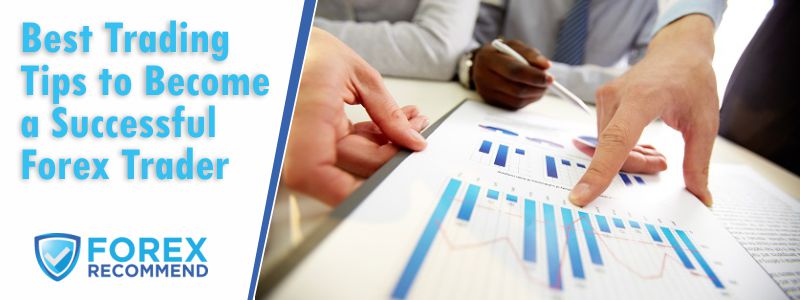
Foreign exchange trading involves the buying and selling currencies on the largest, most volatile, and liquid financial market globally, the forex market.
At some point, every successful forex trader was a novice trader who had started from the very beginning in learning how to trade, placing trades, losing trades, winning trades, and growing their trading skill.
Becoming a successful trader can take years, and it will take hard work, dedication, patience, and a few other considerations.
To become a successful trader, novice traders must follow these tips:
- Create a Trading Strategy and Stick to It
- Determine Your Expectancy
- Plenty of Practice before Starting
- Recognize Your Limits
- Conduct a Weekend Analysis
- Check and Limit Your Feelings
- Maintain a Steady Pace in Your Trading
- Maintain a Paper Record
- Select the Most Appropriate Trading Partner for You
- Learn About Forex Trading
Top 10 Forex Brokers Broker Rating Regulators Min Deposit Leverage Website Top 10 Forex Brokers Broker Rating Min Deposit Leverage
1. Create a Trading Strategy and Stick to It: Novice traders must sit down and develop a trading plan that they can incorporate into a solid trading strategy. The first step is to understand what their trading needs and objectives are and determine what they need next to grow their trading skill.
The value of proper preparation before starting to trade can determine success or failure. Retail forex traders must align themselves with their personal goals and unique characteristics and use this to select appropriate financial instruments.
A trading strategy is a plan that contains the following information.
- Entry and exit levels
- Position Size
- Stop-loss levels
- Take profit levels
- Technical indicators that must be used to confirm the entry and exit points
When traders select their trading strategy, they must consider these components.
- Timeframe – this will indicate the type of trading and trading style that is appropriate for the trader's temperament. Trading five-minute charts or a daily chart indicate that the trader is comfortable with short-term trading that does not carry overnight risk. Choosing weekly charts indicates that traders are comfortable with overnight risk and higher risk tolerance.
- Methodology refers to the specific technical indicators and methods that the trader uses. Some traders like to trade support levels or resistance levels, while others prefer breakout trading.
- Market or Financial Instrument refers to the asset classes such as major forex pairs, minor currencies, exotics, CFDs, commodities, cryptocurrency trading, and so on. Every market has different trading strategies and different types of traders that trade them.
Traders must create a trading strategy because it provides them with a plan that they can follow.
Traders need to follow their strategy because it will allow them to make informed, accurate, and logical trading decisions instead of letting their emotions get out of control.
2. Determine Your Expectancy: Traders must ensure that their trading strategy and plan are reliable. This involves going back across trades and measuring how many traders were winners versus the losing trades.
The next step is to determine the profitability of the successful trades versus how much trading capital was lost during the losing trades. Traders can consider their latest ten trades to provide an accurate overview of this.
For novice traders who have not yet started trading, traders can take their weekly chart and go back to where their trading system would have shown an entry or exit point into/out of a trade.
Using the weekly chart, traders can determine whether they would have made a profit or a loss. These results, both in practice and theory, must be written down.
Traders can use several calculations to determine an approximate percentage of profit that they could earn with a solid trading plan. However, this can change because market conditions can change on any given trading day.
An example of how traders can calculate their expectancy is as follows.
- The expectancy is (% Won x Average Win) – (% Loss x Average Loss)
3. Plenty of Practice before Starting: One of the best ways for traders to practice trading before they start using a live trading account where their real money is at risk is a demo or practice account.
Demo accounts are trading accounts that are funded with virtual money but are still connected to a live market. Real-time trades can be placed, and these trades represent actual profit and losses but without the trader making real profits or losing real money.
Apart from the demo account catering for beginners in the forex market who need to practice trading before going into a live market condition, practice trading can also be used by experienced traders who trade foreign exchange markets.
For successful trading and to realize potential profits or how profitable trade can be, advanced traders must test and backtest their trading strategies in mock real live market conditions before they apply them.
Practicing trading is an important tip because it helps traders refine their trading and improve their overall trading skills, helping them towards becoming successful traders.
4. Recognize Your Limits: Before starting to trade, traders must determine what their risk tolerance and willingness are to be exposed to risks. Traders must determine what level of risk they are comfortable with and set their risk-reward ratio or loss ratio for every trade.
The risk-reward ratio indicates the potential profit that the trader can earn for a bit of capital that the trader risks on investment. Risk-reward ratios are used by successful traders to compare the expected returns with how much they risk obtaining such profits.
An ideal risk-reward ratio for beginner traders is either 1:3 or 1:2, where the trader does not risk more than 1% of their trading balance on a trade in the prospect of earning twice or three times what they are willing to risk. If the trader risks $1 of their capital, they expect to earn at least $3 or $2.
When traders realize where their limits lie, they can decide which trades they should take and whether they will be worth the risk. Therefore, it is important that traders understand their limits and that they use their trading strategy to stay within these limits.
Other tools that traders can employ to help with their limits refer to risk management tools such as stop-loss orders. These tools exit the position of the trader automatically when a specific exchange rate is reached.
5. Conduct a Weekend Analysis: The foreign exchange market is open 24 hours a day, 5 days a week, closing on public holidays and over weekends, with trading ending on a Friday and resuming on a Monday.
While there is no active trading going on, traders can use this time to study the weekly charts of their financial instruments to find patterns or news that could affect their trade.
Just because trading is not currently happening does not mean that the market will open at the same prices at which they closed. Fundamental analysis and technical analysis are two crucial components that traders should use in combination.
Patterns form in the forex market, and traders need to learn what to look out for, how it can affect their trade, and what they can do to either profit from the trading opportunity or protect themselves from loss.
6. Check and Limit Your Feelings: Successful traders in the forex market know that emotions are one of the things that can destroy a successful trading plan. Fear and greed are two of the strongest emotions that drive any financial market, especially the forex and the stock market.
When a large portion of the market has a fear of missing out on trading opportunities, traders tend to jump into the trade without prior thought or practicing any caution, which could land them up in highly volatile market conditions.
When retail traders trade too hastily, they could face significant losses if the market moves against their position. Greed is a very dangerous emotion that must be controlled by sticking to a solid trading plan.
Greed can cause traders to go after multiple trades, which is a form of overtrading. It can also cause traders to abandon their risk-reward ratio and place too much trading capital in a single trade.
To become a successful trader, traders must keep their emotions controlled and stick to their trading strategy regardless of what happens in live market conditions.
7. Maintain a Steady Pace in Your Trading: Trading must never be seen as a sprint but a marathon that requires constant dedication, patience, and logical trading decisions that are based on facts and not emotions.
Traders must maintain a steady pace in their trading and stick to their trading plan. In addition, traders must always consider the bigger picture and not be discouraged when they experience a loss.
Maintaining a steady pace also entails continuing with the trading plan even when a loss is experienced. Traders must be able to accept wins and losses as part of the overall process and to remain focused.
Traders must set realistic goals to ensure that they can keep trading in perspective. In addition, traders must ensure that they break from trading to remain focused, disciplined, and objective.
This is an important tip because it will teach traders discipline and control. While traders cannot control the market conditions, they can control their reactions and actions.
8. Maintain a Paper Record: Traders are urged to always keep a trading journal as it can be a valuable tool when it is maintained properly.
A trading journal is not only a detailed summary of the trading strategy, but it is also something that traders can use to write their observations, notes, ideas, and other components that will help them grow and improve as a trader.
A trading journal can help traders maximize their strengths while it helps them methodologically improve on their weaknesses. The trading journal can help traders iron out technical issues in their trading strategy and help them improve it to become a winning strategy.
9. Select the Most Appropriate Trading Partner for You: This is one of the most important tips, and beginner traders must realize that their forex broker can be the difference between success and failure. Before choosing a broker and/or platform, traders must evaluate every aspect of the broker, including.
- The type of broker that they are and what unique services they offer
- The trading accounts that are offered
- The type of trading platform that they provide
- Their customer service
- Trading conditions which include the trading fees and non-trading fees
- Payment methods that can be used for deposits and withdrawals
- Forex education that is offered
- Standalone trading tools provided (technical analysis, fundamental analysis, news blogs, economic calendar, and so on)
- Regulation and licenses
- Whether there is a wide range of markets offered
10. Learn About Forex Trading: One crucial thing that most successful traders will always advocate revolves around the fact that traders should never stop learning.
Traders who want to be successful must ensure that they are linked to educational materials and sources to ensure that they can continue evolving and improving.
The forex market is dynamic, and it is active, which requires that forex traders be proactive in staying updated on what is going on in the world.
What Traders Need to Know before Starting Forex Trading
Before they start trading, traders must know how to get the fundamentals right by learning how to trade forex.
To help them understand the market better, beginner traders must consider the following.
- The currency pairs that they want to trade
- The significance behind the bid-ask spread
- What leverage is, when to use it, and how to use it
- Forex trading strategies, what they are, and how to develop one
- How to develop a trading plan and how to stick to it
- How to keep emotions and biases in check
- How to choose the right forex broker and trading platform
Beginner traders must ensure that they.
- Start small
- Never stop learning
- Set aside funds
- Set aside time
- Time their trades
- Cut losses by using limit orders
- Be realistic about profit expectations and make consistent profits
- Stick to their trading plan
What is the Importance of Education of Forex Trading before Starting?
Forex trading education will help traders familiarize themselves with important knowledge. It will also help them apply the knowledge that they have learnt in their daily trading activities.
Education is a long-term tool that will help traders develop optimal processes and the best possible solutions to becoming profitable traders.
Trading education will help traders determine when they should enter or exit a trade by teaching them about trading strategies. When traders have developed a solid trading strategy, they will be able to determine the perfect time to enter/exit trades in the forex market.
What Skills are Important to Manage Risks in Forex Trading?
The best risk management strategies in forex trading are:
1. Understand the forex market
2. Understand Leverage
3. Build a good trading plan
4. Set a risk-reward ratio
5. Always use stops and limits
6. Keep emotions in check
7. Stay updated with news and upcoming political and economic events
8. Start trading with a demo account before using a real account
These skills can be gained as forex traders start and consult different educational materials and resources.
As traders start trading using demo accounts, they can start using these skills to see their effect. As traders progress, they will develop these skills effortlessly and apply them without thinking.
Should You Rely on Real-Time Forex Trading signals?
Yes, you can rely on real-time forex trading signals.
Forex trading signals are real-time suggestions for entering a trade on specific financial instruments. The signal can either be generated by other traders, or it can be signaled by a forex trading robot.
Forex trading signals are only as reliable as the service that is providing them. Most free trading signals are not as reliable as the signals that come from a well-regulated and trusted provider.
The importance surrounding a trading strategy relates to the fact that it provides traders with an indication of when they should enter/exit the market, where they should place their orders, and for how long they should hold their position.
A trading strategy prevents traders from trading frantically or trading according to their emotions in a time when market conditions are not ideal.
What Methods do Successful Forex Traders Use?
Successful retail forex traders understand how the forex market works, trust their analysis, and follow the rules of their forex trading strategy. Beginner traders can start practicing this by using demo accounts and following the tips that successful traders have used to make consistent profits.
Table of Contents













